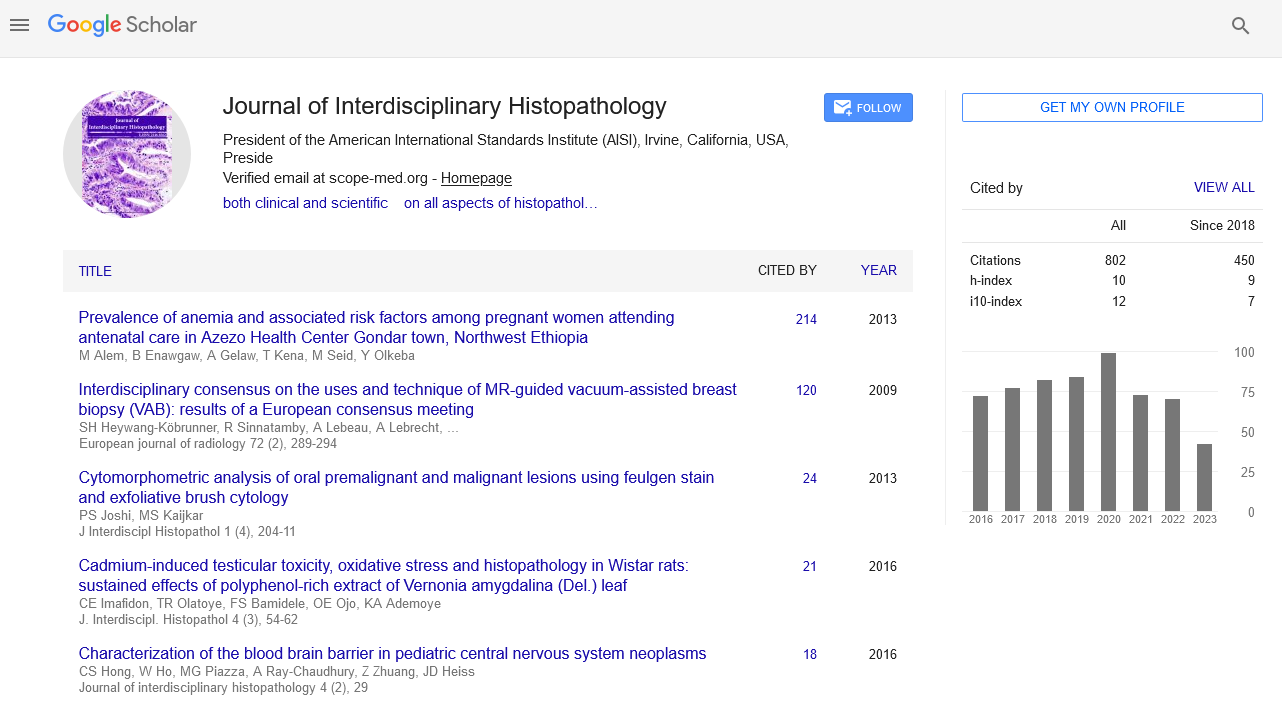Opinion - Journal of Interdisciplinary Histopathology (2024)
Potential Involvement of Neuroinflammation, Immune Dysregulation, and Gut Microbiota in Fibromyalgia Development
García Austen*García Austen, Department of Neurology, University of Wollongong, Wollongong, Australia, Email: ga.stca_674@hotmail.com
Received: 16-Apr-2024, Manuscript No. EJMJIH-24-135367; Editor assigned: 19-Apr-2024, Pre QC No. EJMJIH-24-135367 (PQ); Reviewed: 03-May-2024, QC No. EJMJIH-24-135367; Revised: 10-May-2024, Manuscript No. EJMJIH-24-135367 (R); Published: 17-May-2024
About the Study
Fibromyalgia is a complex and often misunderstood condition characterized by chronic widespread pain, fatigue, and cognitive disturbances. Despite its prevalence, the exact pathogenesis of fibromyalgia remains elusive, contributing to challenges in diagnosis and treatment. Emerging research, however, points to a multifactorial etiology involving neuroinflammation, immune dysregulation, and gut microbiota alterations. Understanding these interconnected mechanisms holds potential for developing more effective interventions and improving the quality of life for individuals with fibromyalgia.
Neuroinflammation: The brain’s silent agony
Neuroinflammation, or inflammation within the Central Nervous System (CNS), is increasingly recognized as a potential contributor to fibromyalgia. This condition is often linked to the chronic activation of glial cells, such as microglia and astrocytes, which release pro-inflammatory cytokines. These cytokines can sensitize pain pathways and disrupt normal neuronal function, leading to the chronic pain and cognitive symptoms observed in fibromyalgia.
Research has shown elevated levels of inflammatory markers, such as interleukin-6 (IL-6) and Tumor Necrosis Factor-Alpha (TNF-α), in the cerebrospinal fluid of fibromyalgia patients. These findings suggest that neuroinflammation might play a central role in perpetuating the symptoms of fibromyalgia. By targeting neuroinflammatory pathways, potential therapeutic strategies could be developed to alleviate pain and cognitive dysfunction in fibromyalgia patients.
Moreover, neuroinflammation can exacerbate the brain’s stress response, further perpetuating the cycle of pain and discomfort. Chronic stress is known to activate the Hypothalamic-Pituitary-Adrenal (HPA) axis, resulting in elevated cortisol levels and altered stress responses. The exchange between neuroinflammation and the HPA axis could explain the heightened pain sensitivity and stress-related exacerbations in fibromyalgia.
Immune dysregulation: An unbalanced defense
Immune dysregulation is another pivotal factor in the pathogenesis of fibromyalgia. The immune system, designed to protect the body from pathogens, can become maladaptive, leading to chronic inflammation and tissue damage. In fibromyalgia, evidence suggests an imbalance between pro-inflammatory and antiinflammatory cytokines, tipping the scale towards a chronic inflammatory state.
Autoimmune components are also being studied as possible contributors to fibromyalgia. Some studies have identified autoantibodies in fibromyalgia patients, suggesting that an autoimmune response might be involved. While fibromyalgia is not classified as an autoimmune disease, the presence of these autoantibodies indicates a degree of immune dysregulation that could contribute to symptomatology.
This immune imbalance can also affect the peripheral nervous system, leading to symptoms such as hyperalgesia (increased pain sensitivity) and allodynia (pain from normally non-painful stimuli). Treatments aimed at modulating the immune response, such as immunomodulatory drugs or antiinflammatory agents, could offer new method for managing fibromyalgia symptoms.
Gut microbiota: The gut-brain connection
The gut microbiota, comprising trillions of microorganisms residing in the digestive tract, plays important role in maintaining overall health. Recent research highlights the gut-brain axis, a bidirectional communication pathway between the gut and the CNS, as a essential factor in the development of various neurological and psychiatric disorders, including fibromyalgia.
Alterations in gut microbiota composition, known as dysbiosis, have been observed in fibromyalgia patients. This dysbiosis can lead to increased intestinal permeability, commonly referred to as “leaky gut,” allowing endotoxins and inflammatory molecules to enter the bloodstream. These molecules can trigger systemic inflammation and potentially contribute to neuroinflammation and immune dysregulation.
Furthermore, the gut microbiota produces various metabolites, such as Short-Chain Fatty Acids (SCFAs), which have anti-inflammatory properties and can influence CNS function. A disruption in the production of these beneficial metabolites due to dysbiosis could exacerbate inflammatory processes and pain sensitivity in fibromyalgia.
Probiotics and dietary interventions aimed at restoring a healthy gut microbiota balance are being examined as potential therapeutic strategies. By improving gut health, it might be possible to mitigate some of the neuroinflammatory and immune dysregulatory aspects of fibromyalgia, offering a novel approach to treatment.
Integrative approaches: Bridging the gap
Given the multifactorial nature of fibromyalgia, an integrative approach to treatment is essential.
Addressing neuroinflammation, immune dysregulation, and gut microbiota alterations requires a comprehensive strategy that includes pharmacological, dietary, and lifestyle interventions.
Anti-inflammatory and immunomodulatory therapies, such as Nonsteroidal Anti-Inflammatory Drugs (NSAIDs), corticosteroids, or biologics targeting specific cytokines, could help manage chronic inflammation and immune dysregulation. Additionally, therapies targeting the CNS, such as antidepressants or anticonvulsants, can modulate pain pathways and alleviate symptoms.
Dietary interventions, including probiotics, prebiotics, and anti-inflammatory diets, can help restore gut microbiota balance and reduce systemic inflammation. Incorporating stress management techniques, such as Cognitive-Behavioral Therapy (CBT), mindfulness, and exercise, can also support overall health and wellbeing, addressing the HPA axis dysfunction often seen in fibromyalgia.
The potential involvement of neuroinflammation, immune dysregulation, and gut microbiota in fibromyalgia development offers new insights into this complex and debilitating condition. By analyzing these interconnected mechanisms, researchers and clinicians can develop more targeted and effective treatment strategies. An integrative approach that addresses the multifaceted nature of fibromyalgia holds potential for improving patient outcomes and enhancing the quality of life for those affected by this challenging disorder.






